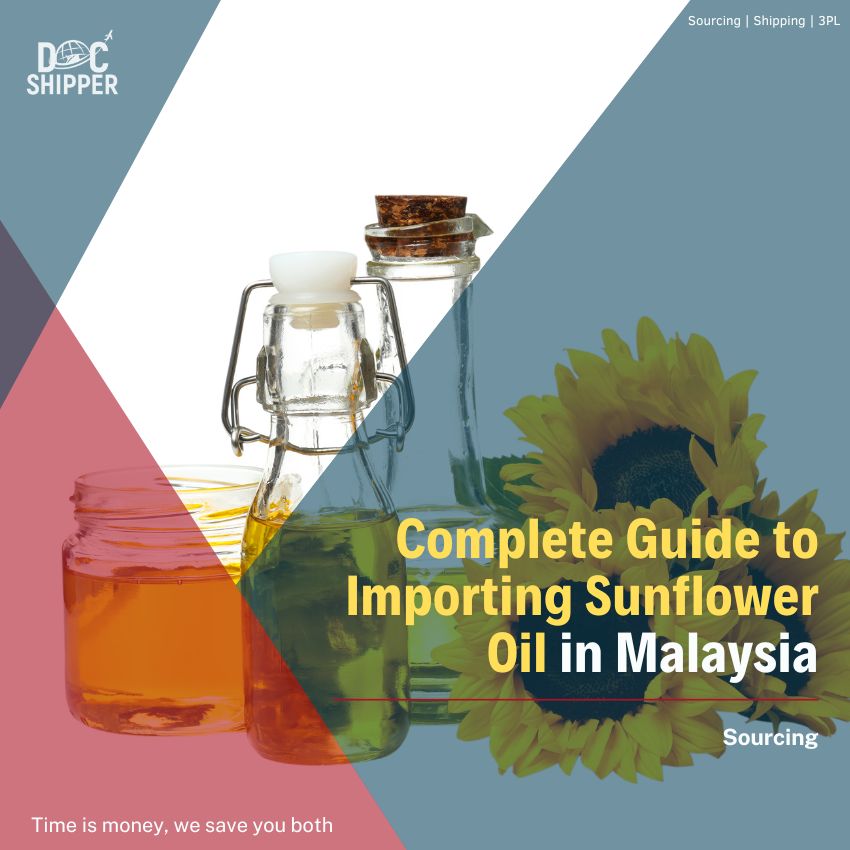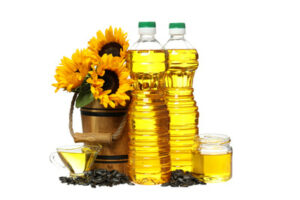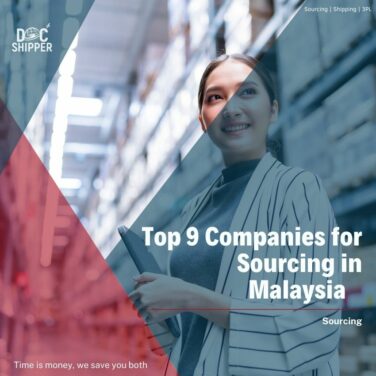The sunflower oil market in Malaysia is booming like never before, rapidly securing a strong 12% share of the cooking oil sector, with a remarkable 15% annual growth over the last three years. This surge in sunflower oil in Malaysia is fueled by growing consumer demand, driven by its proven heart-healthy benefits and unmatched versatility in everyday cooking.
We will dive deep into Malaysia’s thriving sunflower oil market, highlights the key players shaping the local vegetable oil landscape, details the essential import procedures, and reveals how DocShipper Malaysia stands ready to streamline your import journey, helping you capitalize on this fast-expanding market with confidence and ease.
The Sunflower Oil Market in Malaysia
The demand for sunflower oil in Malaysia has been steadily increasing due to rising health awareness and changing consumer preferences. Understanding the key global suppliers of sunflower oil in Malaysia is essential for businesses and importers aiming to secure a reliable and cost-effective supply of this important cooking oil
Current Demand for Sunflower Oil in Malaysia
The demand for sunflower oil in Malaysia has experienced significant growth over the past few years. In 2024, sunflower oil accounted for approximately 12% of the edible oil market share, up from 7% in 2021—representing a 15% annual growth rate. This upward trend is largely driven by increasing health awareness among Malaysian consumers and a shift toward alternative vegetable oils with better nutritional profiles.
Malaysia currently imports over 85% of its sunflower oil needs, with major sourcing countries including Ukraine, Argentina, and Turkey. The rising popularity of sunflower oil is especially notable in urban areas, where health-conscious purchasing behaviors are more prominent.
Benefits of Sunflower Oil for Malaysian Consumers
One of the key drivers behind the rise of sunflower oil in Malaysia is its well-documented health benefits. High in unsaturated fats, particularly linoleic and oleic acids, sunflower oil is known to support cardiovascular health. This makes it particularly appealing to Malaysian consumers who are increasingly concerned about lifestyle-related diseases such as high cholesterol and hypertension.
Moreover, sunflower oil’s high smoke point (up to 232°C) makes it ideal for Malaysian cooking styles, especially deep-frying and stir-frying, which are common in both home and commercial kitchens. Its neutral taste allows it to blend seamlessly into various local dishes—from nasi goreng to ayam goreng—without altering their flavor profiles.
Major Sunflower Oil Suppliers to Malaysia
As demand for sunflower oil in Malaysia continues to rise, identifying reliable sourcing partners is essential for importers. Malaysia relies on several major global suppliers, each offering unique advantages in terms of price, volume, and product quality. Understanding these sourcing origins allows businesses to optimize procurement and reduce supply chain risks.
Top Exporting Countries
Malaysia sources the majority of its sunflower oil imports from a few dominant countries. Recognizing these key suppliers helps businesses optimize their import sourcing strategies and maintain a competitive edge in Malaysia’s evolving market. Here’s a ranked overview based on export volume to Malaysia (2024–2025 estimates):
-
Ukraine remains Malaysia’s top sunflower oil supplier, accounting for approximately 42% of total imports. Known for its vast production capacity and competitive export pricing, Ukraine offers both crude and refined sunflower oil, making it ideal for large-scale importers.
-
Russia provides around 25% of sunflower oil in Malaysia, particularly excelling in bulk shipments. Russian suppliers are favored for their stable production cycles and reliability in fulfilling high-volume orders.
-
Argentina contributes an estimated 15% of Malaysia’s sunflower oil imports. The country is renowned for producing refined sunflower oil that meets high international standards.
-
Turkey’s share of sunflower oil in Malaysia is growing steadily, currently making up about 10% of imports. Turkish exporters are increasingly sought after for mid-range pricing and flexible packaging solutions, including bottled and private-label formats tailored for the Malaysian market.
-
The European Union supplies around 8% of sunflower oil in Malaysia, especially premium segments such as organic and high-oleic oils. Countries like Spain, Italy, and France cater to niche health-conscious consumers and gourmet food brands in Malaysia that demand traceable, sustainable products.
Leading Brands in the Malaysian Market
Several well-known international brands have made a strong mark in the sunflower oil market in Malaysia, shaping consumer preferences and influencing purchasing decisions. These import brands stand out by offering a combination of quality, affordability, and specialty options that meet the diverse needs of Malaysian households and foodservice providers.
-
Doğa, Yudum (Turkey): These Turkish brands are popular for offering affordable yet good-quality sunflower oil in Malaysia. Their products are widely available in supermarkets and wet markets across Malaysia.
-
Oleina, Chumak (Ukraine): Representing Ukraine’s export strength, Oleina and Chumak are among the most trusted brands in the sunflower oil in Malaysia market. These brands are renowned for their consistent quality, mild taste, and versatility in Malaysian cooking styles.
-
Lesieur (France) is recognized for its premium sunflower oil in Malaysia products, appealing to consumers who prioritize refined, healthier cooking oils. This brand is favored by Malaysian customers looking for oils with better nutritional profiles.
-
Oilio, Floriol (Various EU countries): These European brands provide a diverse range of sunflower oil in Malaysia, including organic and specialty oils that cater to evolving consumer preferences. Increasingly popular among Malaysian buyers, Oilio and Floriol are known for their high standards and sustainable sourcing.
DocShipper Tip
Docshipper Tip: When sourcing sunflower oil, don’t just focus on the cheapest price; many suppliers lack valid export licenses or fail quality audits. A great deal can turn into a costly mistake if the product doesn’t meet Malaysian import standards.DocShipper Malaysia’s procurement service helps you identify certified, trustworthy suppliers, conduct quality checks, and negotiate better terms. Talk to us if you want to secure a strong supply chain.
Types of Sunflower Oil for the Malaysian Market
The market for sunflower oil in Malaysia is evolving, driven by diverse consumer needs and cooking habits. Understanding the primary types of sunflower oil enables businesses to more effectively address the increasing demand for quality and variety.
To make informed decisions, it’s important to understand how sunflower oil compares with other popular oils on the Malaysian market, especially palm oil, which still dominates. The table below highlights key differences to help you position sunflower oil in Malaysia as a healthier, value-added alternative.
| Criteria | Sunflower Oil | Palm Oil |
| Taste & Appearance | Light, neutral taste, perfect for salads & light frying | Stronger taste |
| Price (Malaysia, 2025) | Competitive: USD 0.63 – 1.20 depending on origin | Cheaper: USD 0.40 – 0.60 |
| Environmental Impact | Less linked to deforestation or biodiversity loss | Heavily debated due to deforestation in Southeast Asia |
| Applications | Ideal for healthy cooking, premium food products, export-ready | Widely used in processed foods and industrial products |
Refined vs. Unrefined Sunflower Oil
As consumer awareness grows, both segments of sunflower oil in Malaysia are evolving to meet diverse dietary and culinary preferences, offering versatility for both traditional and health-driven cooking.
Refined sunflower oil in Malaysia dominates the market, representing nearly 85% of total consumption. Its widespread use is due to its neutral taste, long shelf life, and high smoke point, making it ideal for popular Malaysian cooking methods like deep-frying and stir-frying. Dishes such as ayam goreng (fried chicken) benefit from the stability and clean flavor of refined oil. This sunflower oil in Malaysia is also the go-to choice for food manufacturers and restaurants that require consistent quality under high-heat conditions.
Meanwhile, unrefined sunflower oil in Malaysia accounts for a smaller 15% of the market, but is growing fast, at a rate of 25% annually. This cold-pressed oil retains much more of its natural nutrients, antioxidants, and aroma, attracting health-conscious consumers seeking natural alternatives. It’s commonly used in salads, marinades, or light sautéing where the oil’s flavor and health benefits can shine through.
High-Oleic Sunflower Oil Options
High-oleic sunflower oil is carving out a niche in the premium oil segment, currently accounting for around 8% of total sunflower oil in Malaysia imports. Known for its high monounsaturated fat content, this oil provides superior oxidative stability, making it especially valuable in high-heat applications and commercial food production.
Its longer frying life, neutral taste, and extended shelf stability make it a top choice for hotels, fast-food chains, and industrial kitchens in Malaysia that require oils capable of repeated use without breaking down or altering flavor. It is particularly useful in deep-frying environments, such as for fried chicken, spring rolls, or tempura-style dishes, where oil quality affects both performance and customer satisfaction. With health trends rising, high-oleic sunflower oil in Malaysia is becoming a strategic choice for businesses aiming to combine performance and wellness.
Malaysian Import Requirements for Sunflower Oil
Importing sunflower oil in Malaysia involves adhering to specific regulations designed to ensure product quality and safety. For businesses targeting the sunflower oil market in Malaysia, understanding these requirements is crucial to facilitate smooth customs clearance and market entry.
Required Documentation for Sunflower Oil Import
To import sunflower oil in Malaysia, the following documents are typically required, and each plays a vital role in ensuring smooth customs clearance and regulatory compliance. These documents not only prove the legitimacy and safety of the product but also align your import with Malaysian trade and food safety standards. Having them in order will help you avoid delays, unexpected costs, and possible rejections at the border.
- Import License: Official authorization allowing the importer to bring sunflower oil into Malaysia.
- Commercial Invoice: A Detailed billing document listing product description, quantity, and value.
- Packing List: Specifies packaging details, weights, and contents to verify shipment accuracy.
- Certificate of Analysis (CoA): Confirms the quality and safety parameters of the sunflower oil batch.
- Phytosanitary Certificate: Required for some origins to certify the product is free from pests and diseases.
Halal Certification Process for Imported Oils
Since Malaysia’s consumers predominantly prefer halal products, obtaining Halal certification for sunflower oil in Malaysia is essential. Importers must secure certification from recognized bodies like JAKIM, which guarantees the oil complies with Islamic dietary laws. This certification strengthens consumer trust and is often mandatory for retail distribution in Malaysia. Without this certification, sunflower oil in Malaysia risks being rejected by retailers and consumers alike. Therefore, ensuring compliance early in the import process helps smooth market entry.
DocShipper Info
DocShipper Malaya Info: It is essential to ensure that sunflower oil imported into Malaysia is properly Halal-certified or complies with international standards. DocShipper Malaysia is here to support you with our quality control services, helping you avoid extra costs and delays. Don’t hesitate to contact our experts for personalized assistance.
Step-by-Step Sunflower Oil Import Process
Importing sunflower oil in Malaysia requires careful planning and coordination to ensure your products arrive on time and meet all quality standards. Each step of the process, from selecting suppliers to local delivery, plays a crucial role in your success. Understanding these steps can help you avoid delays, reduce costs, and guarantee customer satisfaction.
Finding Reliable Suppliers of Sunflower Oil in Malaysia
Choosing the right supplier is vital when sourcing sunflower oil in Malaysia. Reliable suppliers provide not only quality oil but also transparency on production methods, certifications, and delivery timelines. It’s important to evaluate potential suppliers based on their export history, certifications such as Halal and ISO, and their ability to meet your volume needs consistently. Requesting samples and performing factory audits are also effective ways to verify quality before committing.
Shipping and Customs Clearance for Sunflower Oil
The import shipping phase involves selecting the most efficient and cost-effective transport mode, typically sea freight for bulk imports or air freight for urgent shipments. For sunflower oil in Malaysia, ensuring all import documentation is accurate and complete is essential for smooth customs clearance. Non-compliance with Malaysian customs rules can lead to delays, fines, or rejection of shipments, so working with experienced customs brokers is recommended.
Additionally, customs clearance for sunflower oil in Malaysia involves navigating product classification codes, import duties, and applicable taxes. This is why many importers choose to partner with experienced freight forwarders or customs brokers, who can handle communication with Malaysian authorities, ensure proper documentation, and prevent your shipment from being held up at customs.
Local Distribution of Sunflower Oil in Malaysia
After successful import and customs clearance, distributing sunflower oil in Malaysia effectively is key to market penetration. Working with established local distributors who understand regional demand patterns, storage conditions, and retail networks helps maintain product quality. Efficient warehousing and transportation within Malaysia also reduce spoilage risks.
Maintaining proper storage and warehousing conditions for your sunflower oil in Malaysia is equally important. Given Malaysia’s hot and humid tropical climate, sunflower oil must be stored in cool, dry environments to prevent oxidation and preserve its quality. Temperature-controlled storage and proper inventory turnover strategies help reduce the risk of spoilage, especially for unrefined or premium oils with shorter shelf lives.
Costs of Importing Sunflower Oil to Malaysia
Understanding the full cost structure of importing sunflower oil in Malaysia is essential for pricing and profit planning. Costs include the price of oil, shipping fees, import duties, taxes, and handling charges. Accurately forecasting these expenses allows businesses to remain competitive in Malaysia’s dynamic market.
Price Comparison of Sunflower Oil by Country
The prices of Sunflower oil in Malaysia vary significantly depending on the country of origin. It can be a significant advantage for buyers prioritizing cost efficiency while maintaining quality. Here’s a snapshot of average wholesale prices in 2025:
| Country | Average Wholesale Price (USD per kg) | Why buy? |
| Ukraine | 1.14 | A leader in large-scale production with highly competitive pricing and reliable supply. |
| Russia | 1.09 | Known for dependable supply and cost efficiency, ideal for bulk orders. |
| Argentina | 1.10 | Offers mid-range pricing with a focus on high-quality refined oil. |
| Turkey | 1.08 – 1.12 | Balances competitive prices with specialty refined oil options. |
| European Union | Above 1.20 | Premium quality with organic certifications and strict regulatory compliance. |
Import Duties and Taxes for Cooking Oils
Import duties on sunflower oil in Malaysia depend on the classification under the Malaysian Customs tariff schedule. Typically, cooking oils face moderate tariffs, but Halal certification and trade agreements can affect rates. Additionally, Goods and Services Tax (GST) of 6% in 2025 or Sales and Service Tax (SST) applies to imports, impacting the landed cost. Importers need to factor in customs broker fees, inspection charges, and potential storage costs. Awareness of these fees helps avoid import surprises and supports transparent pricing strategies.
DocShipper Alert
DocShipper Malaysia Alert: Many importers underestimate the importance of accurate HS codes and complete documentation, a common mistake that can lead to customs delays, fines, or even shipment seizure. DocShipper Malaysia handles these complexities for you through our customs clearance service, ensuring your goods clear customs smoothly and on time. Contact us today for reliable support.
DocShipper’s Sunflower Oil Import Services
DocShipper has developed specialized expertise in handling sunflower oil imports in Malaysia, providing tailored solutions that simplify the entire process. From supplier sourcing to final delivery, our team ensures smooth operations, regulatory compliance, and cost control.
Our Experience with Sunflower Oil in Malaysia Imports
Our track record includes managing shipments of sunflower oil in Malaysia from major global producers, including Ukraine, Russia, and the European Union. We understand the specific requirements for food-grade oil imports, including quality standards, Halal certification, and Malaysian regulatory frameworks. Our experience helps clients avoid common pitfalls such as documentation errors or customs delays.
How We Can Help You Import Sunflower Oil
DocShipper offers comprehensive services including supplier identification, contract negotiation support, freight forwarding (air and sea), customs clearance assistance, quality control inspections, and express shipping. By choosing us, importers of sunflower oil in Malaysia gain a trusted partner to manage logistics challenges, reduce costs, and ensure timely deliveries. Our end-to-end approach allows you to focus on growing your business with peace of mind.
DocShipper Tip
DocShipper Malaysia Advice: Whether you are a wholesaler or retailer, staying informed about the main suppliers and trusted brands of sunflower oil in Malaysia will help you meet the growing demand efficiently and confidently. At DocShipper, we support your import needs worldwide through our logistics services, including air freight and sea freight. Feel free to contact us for more information and expert assistance.
Conclusion
Importing sunflower oil in Malaysia presents great business opportunities but requires a solid understanding of regulatory requirements, essential certifications like Halal, and efficient supply chain management. Navigating supplier selection, local compliance, and cost control can be challenging, especially for new importers.
This is where DocShipper Malaysia becomes your trusted strategic partner. With our comprehensive expertise in quality control, international logistics, and personalized support, we simplify every step of your sunflower oil import process.
FAQ | How to Import Sunflower Oil from Malaysia?
Read more
Looking for more? These articles might interest you:
DocShipper info: Do you like our article today? For your business interest, you may like the following useful articles :
Need Help with Logistics
or Sourcing ?
First, we secure the right products from the right suppliers at the right price by managing the sourcing process from start to finish. Then, we simplify your shipping experience - from pickup to final delivery - ensuring any product, anywhere, is delivered at highly competitive prices.

Fill the Form
Prefer email? Send us your inquiry, and we’ll get back to you as soon as possible.
Contact us








